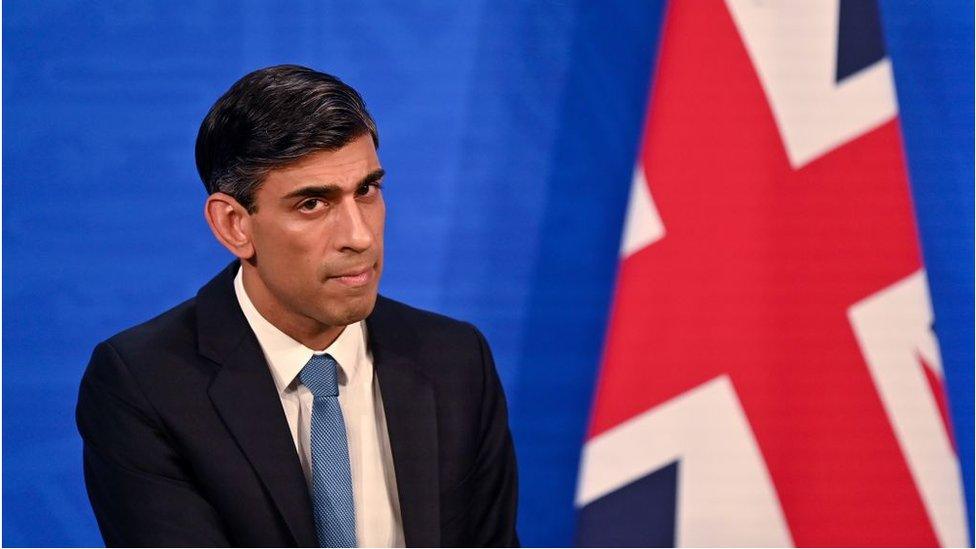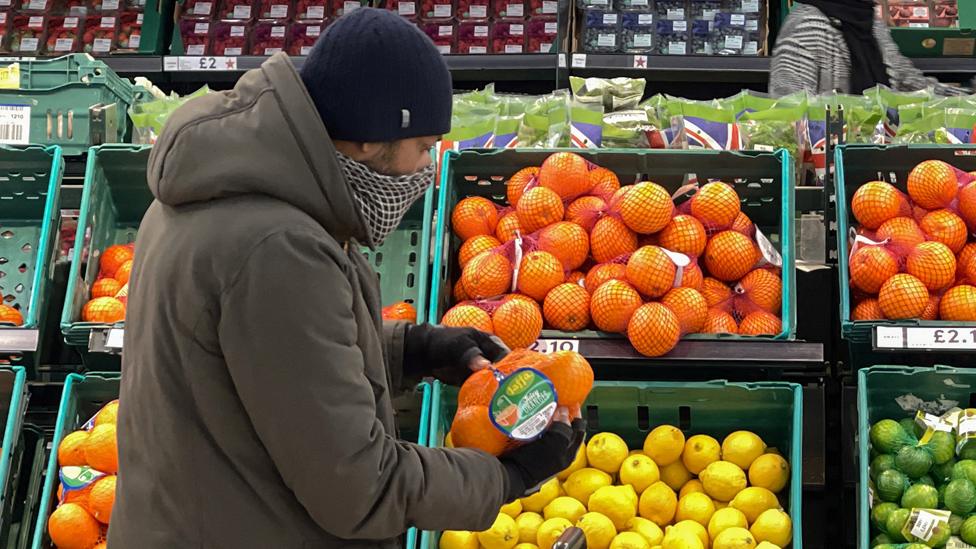Ukraine brings significant economic uncertainty, Rishi Sunak warns
- Published
- comments

Russia's invasion of Ukraine means significant uncertainty for the UK economy, the chancellor has warned.
This is despite UK growth bouncing back in January as the effects of the Omicron Covid variant began to ease.
The economy grew by 0.8% compared with a 0.2% contraction in December the Office for National Statistics said, external.
But one industry body warned the UK faced a higher risk of recession as the impact of the Ukraine conflict would add to the sharp rise in living costs.
UK households were already facing sharply rising costs before Russia's invasion of Ukraine, in part due to soaring energy costs.
The conflict in Ukraine pushed the price of oil to its highest level for nearly 14 years at one point and this has had a knock-on impact on fuel costs, with UK petrol prices hitting record highs.
Gas prices have also soared, leading to warnings that average energy bills could reach £3,000 per year in October, after rising to £2,000 in April when the energy price cap is raised.
Grain prices have also jumped as both Russia and Ukraine are major global producers, particularly of wheat.
"Russia's invasion of Ukraine has increased the risk of a recession in the UK by exacerbating the already acute inflationary squeeze on consumers and businesses and derailing the supply of critical commodities to many sectors of the economy," said Suren Thiru from the British Chambers of Commerce (BCC).
Mr Thiru said January's growth was now like looking into a rear-view mirror.


The bounce back in the economy in January was not just stronger than expected, it was also seen in buoyant tax revenues.
The effect of the Omicron Covid variant proved to be a blip, as wholesalers, retailers and IT and communication services pushed growth up.
Consumer-facing services - restaurants, bars, entertainment, and travel - are still 6.8% below the level before the pandemic.
All in all, the economy was on course to maintain its return to normal after the pandemic.
However, the cost of living and energy squeeze was already weighing on the economy.
The economic consequences of the Ukraine invasion are pushing both inflation and growth in the wrong direction.
While a line may now thankfully be drawn under the pandemic's economic hit, the inflationary cloud is now looking very dark indeed.

The ONS figures show the UK's economy rebounded in January, with wholesaling, retailing, restaurants and takeaways all performing well.
While supply chain issues continued to dog some sectors, construction and manufacturing both grew, the ONS said.
Computer programming and film and TV production also had a good start to the year, said Darren Morgan, ONS director of economic statistics.
"GDP bounced back from the hit it took in December due to the Omicron wave and is now 0.8% above its pre-pandemic peak," he said.
"All sectors grew in January with some industries that were hit particularly hard in December now performing well."
'As good as it gets'
Mr Sunak said that Russia's invasion "is creating significant economic uncertainty", but "it is vital that we stand with the people of Ukraine to uphold our shared values of freedom and democracy and ensure Putin fails".
He added that the government had "provided unprecedented support" throughout the Covid pandemic, "which has put our economy in a strong position to deal with current cost of living challenges".
Labour's shadow chief secretary to the Treasury, Pat McFadden, said households were facing "a year of surging inflation, weak earnings growth and tax rises".
He called for the government to halt a planned National Insurance increase in April.
Mr McFadden also said the government "must look again at Labour's proposal for a one-off windfall tax on oil and gas producers to cut household energy bills by up to £600".
Paul Dales, chief UK economist at Capital Economics, said that while the economy had "rebounded with vigour" in January, "the cost of living crisis and the influence of the war in Ukraine probably means this is as good as it gets for the year".
He added that growth "will probably slow throughout the year".
Despite this, Mr Dales still expects the Bank of England to increase interest rates at its meeting on Thursday next week, with the main Bank rate likely to rise from 0.5% to 0.75%.
Related topics
- Published10 March 2022

